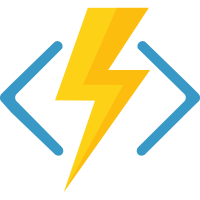| Branch | Status |
|---|---|
| master | |
| v1.x |
Azure Functions Core Tools
The Azure Functions Core Tools provide a local development experience for creating, developing, testing, running, and debugging Azure Functions.
Versions
v1 (v1.x branch): Requires .NET 4.7.1 Windows Only
v2 (master branch): Self-contained cross-platform package
Installing
Windows
Both v1 and v2 of the runtime can be installed on Windows.
To install v1 with npm:
npm i -g azure-functions-core-tools@1To install v1 with chocolatey:
choco install azure-functions-core-tools --version 1.0.15 To install v2 with npm:
npm i -g azure-functions-core-tools --unsafe-perm trueTo install v2 with chocolatey:
choco install azure-functions-core-toolsMac
Homebrew:
brew tap azure/functions
brew install azure-functions-core-toolsLinux
Ubuntu/Debian
- Set up package feed
Ubuntu 18.04
wget -q https://packages.microsoft.com/config/ubuntu/18.04/packages-microsoft-prod.deb
sudo dpkg -i packages-microsoft-prod.debUbuntu 17.10
wget -q https://packages.microsoft.com/config/ubuntu/17.10/packages-microsoft-prod.deb
sudo dpkg -i packages-microsoft-prod.debUbuntu 16.04 / Linux Mint 18
wget -q https://packages.microsoft.com/config/ubuntu/16.04/packages-microsoft-prod.deb
sudo dpkg -i packages-microsoft-prod.deb- Install
sudo apt-get update
sudo apt-get install azure-functions-core-toolsOther Linux Distributions
- Download latest release
Download the latest release for your platform from here.
- Unzip release zip
Using your preferred tool, unzip the downloaded release. To unzip into an azure-functions-cli directory using the unzip tool, run this command from the directory containing the downloaded release zip:
unzip -d azure-functions-cli Azure.Functions.Cli.linux-x64.*.zip- Make the
funccommand executable
Zip files do not maintain the executable bit on binaries. So, you'll need to make the func binary executable. Assuming you used the instructions above to unzip:
cd azure-functions-cli
chmod +x func
./func- Optionally add
functo your$PATH
To execute the func command without specifying the full path to the binary, add its directory to your $PATH environment variable. Assuming you're still following along from above:
export PATH=`pwd`:$PATH
funcCode and test Azure Functions locally
NOTE: npm can be used on all platforms. On unix platforms, you may need to specify --unsafe-perm if you are running npm with sudo. That's due to npm behavior of post install script.
NOTE: If you're running the v2 on Windows, Linux, or Mac, make sure to enable the beta runtime in function app settings, otherwise you may not see the same results as running locally.
Getting Started on Kubernetes
Using the Core Tools, you can easily run Azure Functions on 1.7+ Kubernetes clusters. The Core Tools will build and push a Docker image of the function to a given registry and create corresponding Kubernetes objects including a Deployment, Service and Horizontal Pod Autoscaler.
First, make sure you init a Docker file.
func init --dockerPrerequisites
Deploy a function to Kubernetes
func deploy --platform kubernetes --name myfunction --registry <docker-hub-id or registry-server>Deploy a function with a minimum of 3 instances and a maximum of 10
func deploy --platform kubernetes --name myfunction --registry <docker-hub-id or registry-server> --min 3 --max 10Get function logs
func logs --name myfunction --platform kubernetes
Provide a kubeconfig file
func deploy --platform kubernetes --name myfunction --registry <docker-hub-id or registry-server> --config /mypath/configDeploying Azure Functions with Virtual-Kubelet
Azure Functions running on Kubernetes can take advantage of true serverless containers model by getting deployed to different providers of Virtual Kubelet, such as Azure Container Instances.
Functions deployed to Kubernetes already contain all the tolerations needed to be schedulable to Virtual Kubelet nodes. All you need to do is to set up VKubelet on your Kubernetes cluster:
Important note: Virtual Kubelet does not currently allow for Kubernetes Services to route external traffic to pods. This means that HTTP triggered functions will not receive traffic running on a VKubelet provider (including ACI).
A good usage scenario for using functions with VKubelet would be with event triggered / time triggered functions that do not rely on external HTTP traffic.
Known Issues:
func extensions command require the dotnet cli to be installed and on your path. This requirement is tracked here. You can install .NET Core for your platform from https://www.microsoft.com/net/download/
Default Directories
CurrentDirectory: is the default directory the functions runtime looks for functions in.%TMP%\LogFiles\Application\Functions: is the default directory for logs. It mirrors the logs directory on Azure as well.
License
This project is under the benevolent umbrella of the .NET Foundation and is licensed under the MIT License
This project has adopted the Microsoft Open Source Code of Conduct. For more information see the Code of Conduct FAQ or contact opencode@microsoft.com with any additional questions or comments.
Contact Us
For questions on Azure Functions or the tools, you can ask questions here:
File bugs at Azure Functions Core Tools repo on GitHub.
